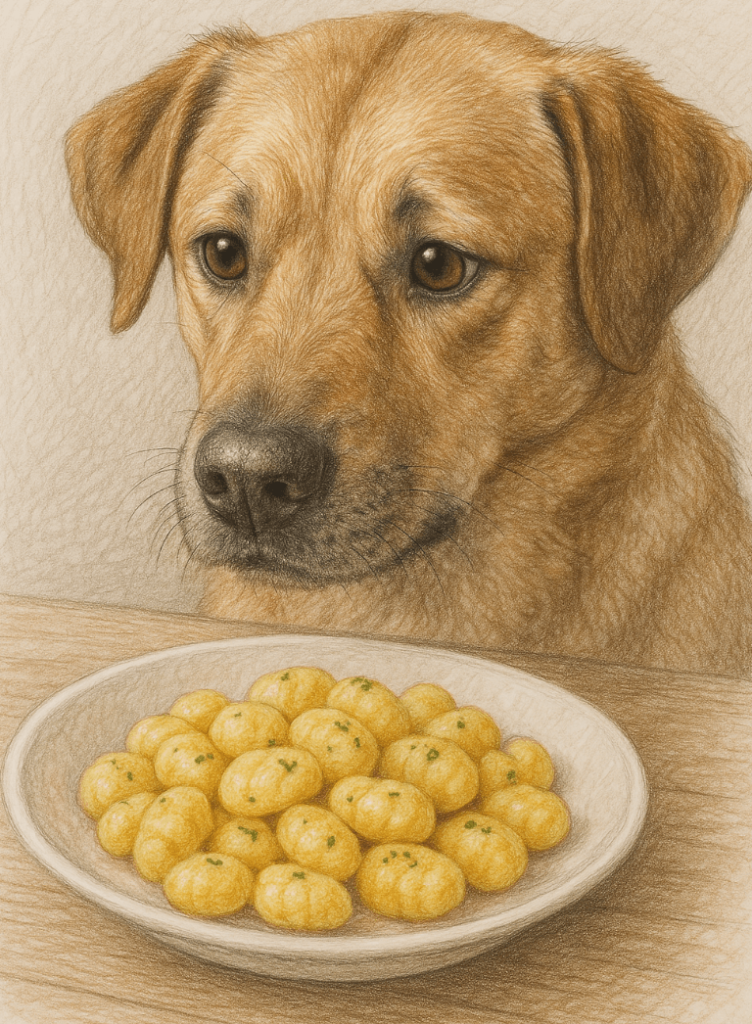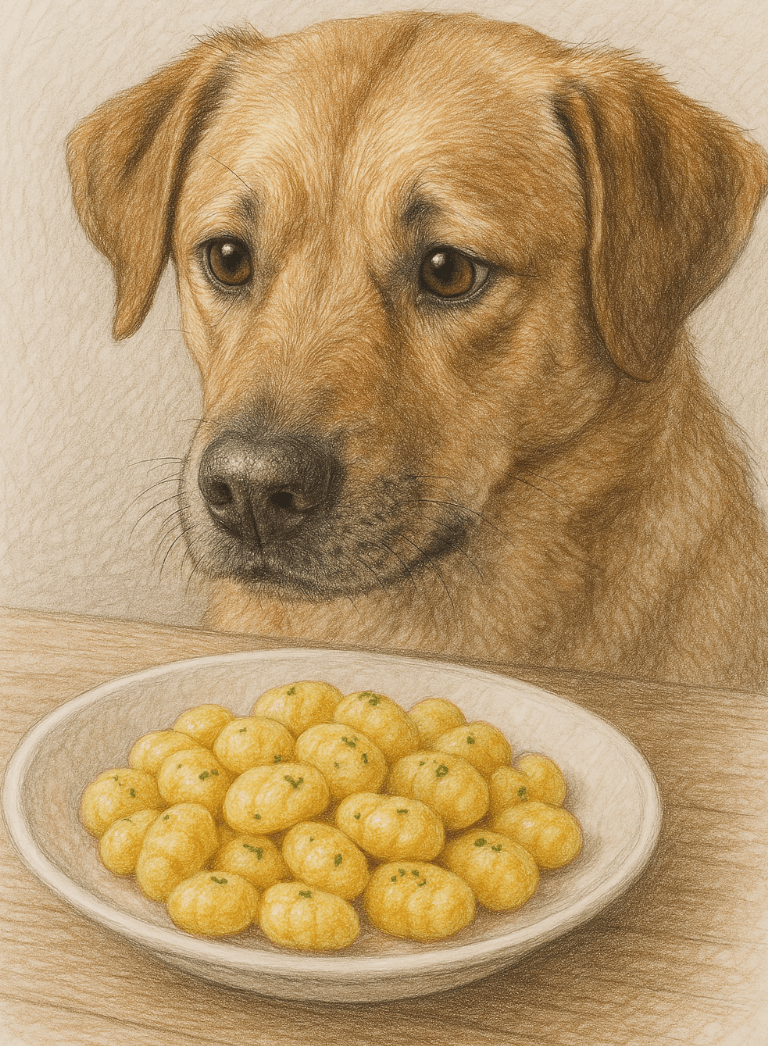Can Dogs Eat Gnocchi? What You Need to Know
Gnocchi, those soft and pillowy Italian dumplings, are a favorite comfort food for many people. But what happens when your furry friend gives you those irresistible puppy eyes while you’re enjoying a plate of gnocchi? As a responsible pet owner, it’s important to know whether this tasty dish is safe for dogs to eat. While some ingredients in gnocchi may be harmless, others could pose risks to your dog’s health. In this blog post, we’ll explore the potential benefits and dangers of feeding gnocchi to your dog, along with safer alternatives and expert tips to keep your pup happy and healthy.
Potential Risks of Feeding Gnocchi to Dogs
While gnocchi may seem like a simple food, it contains several ingredients that could harm your dog if consumed in large quantities. Understanding these risks will help you make an informed decision about sharing this dish with your pet.
High Carbohydrate Content:
Gnocchi is made primarily from potatoes or flour, which are high in carbs. Excessive carbs can lead to weight gain and digestive upset in dogs.Salt and Seasonings:
Many gnocchi recipes include added salt, garlic, or onion powder, all of which are toxic to dogs and can cause serious health issues.Gluten Sensitivity:
Some dogs are sensitive to gluten, found in wheat-based gnocchi, which can lead to gastrointestinal discomfort or allergic reactions.Risk of Choking:
The dense texture of gnocchi may pose a choking hazard, especially for smaller dogs or those prone to gulping their food.Caloric Overload:
Gnocchi is calorie-dense, and feeding it regularly could contribute to obesity, which increases the risk of health problems like diabetes.
These risks highlight why caution is essential when considering giving gnocchi to your dog. Always prioritize their safety over indulgence.
Benefits of Gnocchi for Dogs (When Prepared Safely)
If prepared carefully and in moderation, plain gnocchi may offer some benefits as an occasional treat. Here’s what you need to know about its potential advantages.
Easily Digestible Base Ingredients:
Plain potato or rice-based gnocchi can be gentle on a dog’s stomach if they don’t have allergies or sensitivities.Low Fat Content (Plain Versions):
Unseasoned gnocchi has minimal fat, making it a better option than fatty human foods that can upset your dog’s digestion.Customizable for Dogs:
You can prepare homemade gnocchi using dog-safe ingredients, ensuring it meets your pet’s dietary needs.Hydration Boost:
Boiled gnocchi retains moisture, which can help keep your dog hydrated, especially if they’re reluctant water drinkers.Mental Stimulation:
Offering small, bite-sized pieces of plain gnocchi as a reward during training sessions can provide mental engagement.
While these benefits exist, they must be weighed against the potential dangers to determine if gnocchi is truly suitable for your dog.
Check this guide 👉Can Dogs Eat Strawberry Cream Cheese? Best 7 Expert Tips!
Check this guide 👉Can Dogs Eat Radicchio? Best 7 Expert Tips!
Check this guide 👉Can Dogs Eat Alligator? Best 7 Expert Tips!

Safe Alternatives to Gnocchi | Risks of Unsafe Ingredients in Gnocchi |
|---|---|
Plain boiled sweet potatoes | Garlic and onion seasoning |
Homemade grain-free dog treats | High sodium content |
Steamed carrots or green beans | Wheat-based dough (for gluten-sensitive dogs) |
Small portions of plain rice | Butter or cream sauces |
Dog-safe pasta (without seasoning) | Artificial flavorings or preservatives |
How to Safely Introduce Gnocchi to Your Dog
If you decide to give your dog gnocchi, it’s crucial to take precautions to minimize risks. Follow these guidelines to ensure a safe experience.
Choose Plain, Unseasoned Gnocchi:
Avoid store-bought gnocchi with added salt, herbs, or spices, as these can be harmful to dogs.Serve in Small Portions:
Offer only a tiny piece as a treat to prevent digestive upset or overeating.Monitor for Allergic Reactions:
Watch for signs of itching, vomiting, or diarrhea after introducing gnocchi, as these could indicate an allergy.Avoid Sauces and Toppings:
Skip butter, cheese, or tomato sauce, as these can upset your dog’s stomach or add unnecessary calories.Consult Your Veterinarian:
Before introducing any new food, seek advice from your vet to ensure it aligns with your dog’s specific dietary needs.
By following these steps, you can mitigate risks while allowing your dog to enjoy the occasional gnocchi treat safely.
Signs Your Dog May Be Struggling After Eating Gnocchi
Even with precautions, complications can arise if your dog consumes gnocchi improperly. Watch for these warning signs to act quickly if something goes wrong.
Vomiting or Diarrhea:
These symptoms may indicate that your dog has ingested something harmful or eaten too much gnocchi.Lethargy or Weakness:
A sudden lack of energy could signal poisoning from toxic ingredients like garlic or onion powder.Excessive Drooling:
Drooling could indicate nausea or irritation caused by the texture or seasoning of the gnocchi.Difficulty Breathing:
Choking or allergic reactions may cause labored breathing, requiring immediate veterinary attention.Swollen Face or Paws:
Swelling is a sign of an allergic reaction and should be addressed promptly to prevent further complications.
Recognizing these signs early allows you to seek veterinary care promptly, preventing further complications.
Common Mistakes to Avoid When Feeding Gnocchi to Dogs
Feeding gnocchi to your dog requires careful consideration to avoid mistakes that could endanger their health. Here are some pitfalls to watch out for.
Offering Store-Bought Gnocchi:
Pre-packaged gnocchi often contains seasonings or preservatives that are unsafe for dogs.Ignoring Portion Sizes:
Giving too much gnocchi can overwhelm your dog’s digestive system and lead to obesity.Adding Sauces or Toppings:
Butter, cheese, or marinara sauce adds unnecessary calories and can upset your dog’s stomach.Feeding Regularly:
Treating gnocchi as a frequent snack rather than an occasional treat can disrupt your dog’s balanced diet.Skipping Veterinary Advice:
Not consulting your vet before introducing new foods can result in unknowingly harming your dog.
Avoiding these mistakes ensures a safer and healthier experience for your dog.
Alternatives That Mimic the Comfort of Gnocchi
If you’re hesitant about feeding gnocchi, there are plenty of alternatives that mimic its comforting qualities without the associated risks.
Boiled Sweet Potatoes:
Rich in fiber and vitamins, sweet potatoes are a nutritious and dog-safe substitute for gnocchi.Steamed Vegetables:
Green beans, carrots, or zucchini provide a low-calorie, nutrient-packed alternative.Homemade Grain-Free Treats:
Recipes using pumpkin, oats, or coconut flour are safe and easy to prepare at home.Plain Rice Balls:
Small portions of plain rice rolled into bite-sized balls offer a similar texture to gnocchi.Dog-Safe Pasta:
Cooked pasta without seasoning or sauces can satisfy your dog’s craving for soft, chewy textures.
These alternatives allow you to cater to your dog’s cravings while keeping them safe.
Understanding Your Dog’s Natural Instincts Around Human Food
Dogs are naturally curious about human food, and their instincts drive them to investigate anything their owners are eating. Understanding their behavior helps explain their fascination.
Scavenger Instincts:
Wild ancestors of dogs scavenged for food, making them naturally drawn to human meals.Desire for Variety:
Dogs crave diverse flavors and textures, which explains their interest in foods like gnocchi.Bonding Through Food:
Sharing food strengthens the bond between humans and dogs, though it must be done safely.Scent-Driven Curiosity:
Dogs use their powerful sense of smell to explore new foods, making aromatic dishes like gnocchi particularly enticing.Comfort Seeking:
Soft, warm foods like gnocchi mimic the comfort of nursing, appealing to their emotional needs.
By recognizing these behaviors, you can better address your dog’s needs in a safe and controlled manner.
Frequently Asked Questions About Dogs and Gnocchi
Is plain gnocchi safe for dogs?
Yes, in small amounts, plain gnocchi without seasoning or sauces is generally safe but should be given sparingly.
Can dogs eat gluten-free gnocchi?
Gluten-free gnocchi made from safe ingredients like rice or corn flour is a better option for dogs with sensitivities.
What should I do if my dog eats seasoned gnocchi?
Contact your veterinarian immediately, especially if the gnocchi contains garlic, onion, or excessive salt.
How much gnocchi can I give my dog?
Limit it to a small bite-sized piece as an occasional treat, not a regular part of their diet.
Are there healthier alternatives to gnocchi for dogs?
Yes, options like plain boiled sweet potatoes, steamed vegetables, or dog-safe pasta are excellent substitutes.
Prioritizing Your Dog’s Health When It Comes to Gnocchi
Feeding gnocchi to your dog can be a fun way to share a special treat, but it comes with significant risks if not handled properly. By understanding the potential hazards, choosing safer alternatives, and consulting your veterinarian, you can ensure your dog stays healthy and happy. Remember, your furry friend relies on you to make the best dietary choices for them—so always prioritize their well-being above all else.
Do Cats Have Taste Buds? Best 7 Expert Tips! – Discover how cats experience flavors and why their taste is so unique.
Do Dogs Have Taste Buds? Best 7 Expert Tips! – Discover how dogs experience taste, their preferences, and what it means for their diet and health.
Can Cats Taste Sweet? Best 7 Expert Tips! – Discover why cats can’t taste sweetness, how it affects their diet, and tips to keep them healthy and happy.
Can Dogs Taste Sweet? Best 7 Expert Tips! – Discover how dogs perceive sweetness, which foods are safe, and tips to manage their sweet cravings responsibly.





